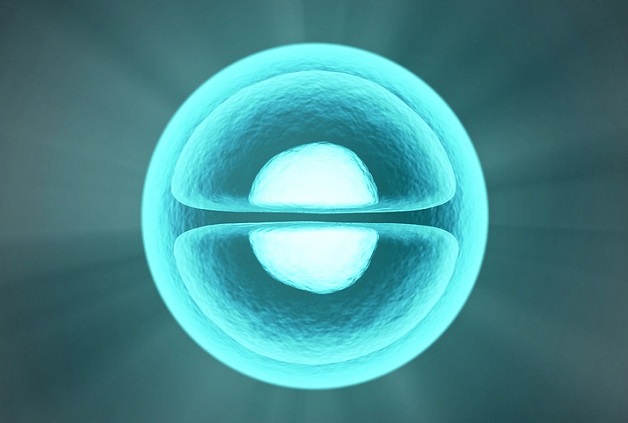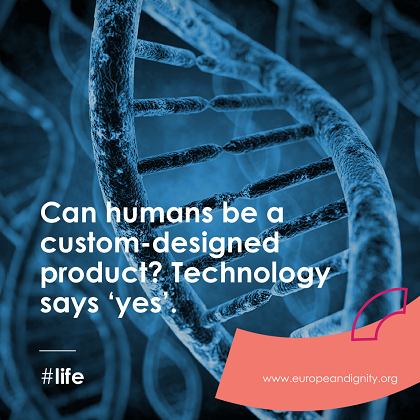Preventing and treating human disease is a praiseworthy goal. But it must not be allowed to become a reason to turn human beings into designer products.

“Comfortably seated in the fertility clinic with Vivaldi playing softly in the background, you and your partner are brought coffee and a folder. Inside the folder is an embryo menu. Each embryo has a description. (…) There are 200 of these embryos to choose from, all made by in vitro fertilization (IVF) from you and your partner’s eggs and sperm. So, over to you. Which will you choose?”
This is how an article published in The Guardian begins. It sounds like science fiction. But technology today not only allows for this but much more. It offers people the dream of overcoming the fundamental problems of humanity.
Modern-day technology also offers a new promise: that we can overcome the painful realities of human existence. We no longer have to accept painful or difficult circumstances. We can instead change ourselves and create some kind of new humanity.
This feeds many people’s belief today that they not only have a ‘right’ to a child but also a right to choose a particular kind of child. Greater access to new reproductive technologies is now coupled with increased willingness on the part of scientists and parents to take risks with future lives – and to pick and choose the characteristics of such lives. Fortunately, some European officials are raising questions about the wisdom of such actions.
THE COUNCIL OF EUROPE REJECTS GENETIC MODIFICATION OF HUMAN BEINGS
In October, the Parliamentary Assembly of the Council of Europe (PACE) submitted a recommendation to the Committee of Ministers asking it to urge member states to put in place a ban on establishing a pregnancy using germ line cells or human embryos which have undergone intentional genome editing. The Council stressed that current scientific consensus maintains that the use of such new genetic technologies to 'create' human beings is not ‘safe’.
In its recommendation, which was based on a report by Petra De Sutter, a Belgian Senator, PACE proposed that the Committee of Ministers should foster public debate on the issue. It further called for efforts to instruct the Council of Europe's Committee on Bioethics to assess ethical and legal challenges, and develop a common regulatory and legal framework.
The recommendation also exhorted the Committee of Ministers to urge all member states that have not ratified the Oviedo Convention to do so as soon as possible. The Oviedo Convention is currently the only international legally binding instrument protecting human rights in the biomedical field. It aims at protecting the dignity and identity of all human beings.
In its Article 13, the Oviedo Convention stipulates that “an intervention seeking to modify the human genome may only be undertaken for preventive, diagnostic or therapeutic purposes and only if its aim is not to introduce any modification in the genome of any descendants.” It thus prohibits assisting the birth of genetically modified human beings.

“THREE-PARENT CHILDREN”: A NEW REALITY
The PACE recommendation, which was adopted by the Council, also explicitly denounces the use of the “three-parent IVF” technique, “despite serious ethical controversies and scientific uncertainties concerning its long-term effects”. The “three-parent IVF” technique involves collecting eggs from a mother with damaged mitochondria and a donor with healthy mitochondria. Doctors then destroy the nucleus of the donor’s egg and insert the mother’s nucleus in its place. The donor’s egg, now with the mother’s nucleus, is then ready to be fertilized by the father.
Babies born following this technique would technically have three genetic parents. A tiny proportion of their DNA would come from their mother, a little bit from their father, and a final amount from a third person: the egg donor.
In October 2015, the United Kingdom became the first country in the world to permit such babies to be born. It also licensed the research use of embryos that have been genetically modified (by gene editing).
The “three-parent IVF” technique raises huge ethical concerns. Nola Leach, the CEO of CARE, an organization based in the UK working on bioethics, has stated: “This procedure is unethical, unproven, dangerous and unnecessary. It allows the design and manufacture of a human being with certain properties and to that extent constitutes a designer baby. The bringing into being of human life becomes a process of human design and manufacture and the result is commodification of people.” This is worth remembering.
We must also remember that the “three-parent IVF” technique does not cure anyone from any disease. What it really does is prevent the birth of human beings who have the potential of having a genetic disease.
A NEW FORM OF EUGENICS?
“Eugenics” – which literally means “good/well born” – is the theory, social philosophy, and practice of human improvement through controlled breeding in order to ensure that desirable characteristics are inherited. This has been used to justify some of the worst medical atrocities in history. Those committed in the name of Nazi ‘medicine’ are just one example, but they seem to have been forgotten.
This is dangerous. In fact, the philosopher Santayana famously warned that “those who cannot remember the past are condemned to repeat it”. Today, combined with new and powerful technologies, the old eugenics movement has evolved even further. It now seeks to produce ‘designer babies’, which is just one example of possible future trends. Others are sure to come – unless we remember our history.
History also teaches us that there is a clear distinction between the intent of the law and the practice of law. The purported reason for the approval of the “three-parent IVF” technique is to enable women with mitochondrial disease to bear biologically related children. But will it stop there? Won’t it become a tool to facilitate the achievement of certain lifestyle desires – and not just a tool for preventing medical problems? That is the risk we face.
HUMANS AS DESIGNER PRODUCTS
Genetically modifying human beings before birth reduces that human into something that can be modified at will and without his/her consent. Imposing specific, pre-determined characteristics on children who have not yet been born is the first step down a road we should not travel. It turns a human being into a ‘designer product’.
Similarly, allowing human beings to be born only if they ‘measure up’ genetically represents a profound shift in what it means to be a human being. It suggests that not all human beings have enough value to justify their existence. If the life of an individual with a genetic disease is not worth preserving, who is next? Those with a propensity for diabetes? Those who might be more prone to Alzheimer’s? Since every human being carries some defective or anomalous genes, where does this stop?
It is our obligation to care more for everyone, regardless of the affliction. John Wyatt, professor emeritus in ethics at University College London, says, “It is the failure of practical caring in our society which often seems to drive a desperate quest for technological fixes to the painful realities of the human condition.” We thus must value each and every individual for who they are – not for how fit or unfit they are, or for what they can or cannot do.
Preventing and treating human disease is an admirable, praiseworthy goal. But it must not be allowed to become a reason to turn human beings into designer products – or to be used as a tool for eliminating people who are suffering.
Roxana Stanciu, Executive Director of European Dignity Watch, based in Brussels. Learn more about how this organisation informs, educates, and equips stakeholders in Europe to make a difference in public life, defending freedom, family, and life; visit EDW's website.

Las opiniones vertidas por nuestros colaboradores se realizan a nivel personal, pudiendo coincidir o no con la postura de la dirección de Protestante Digital.
Si quieres comentar o